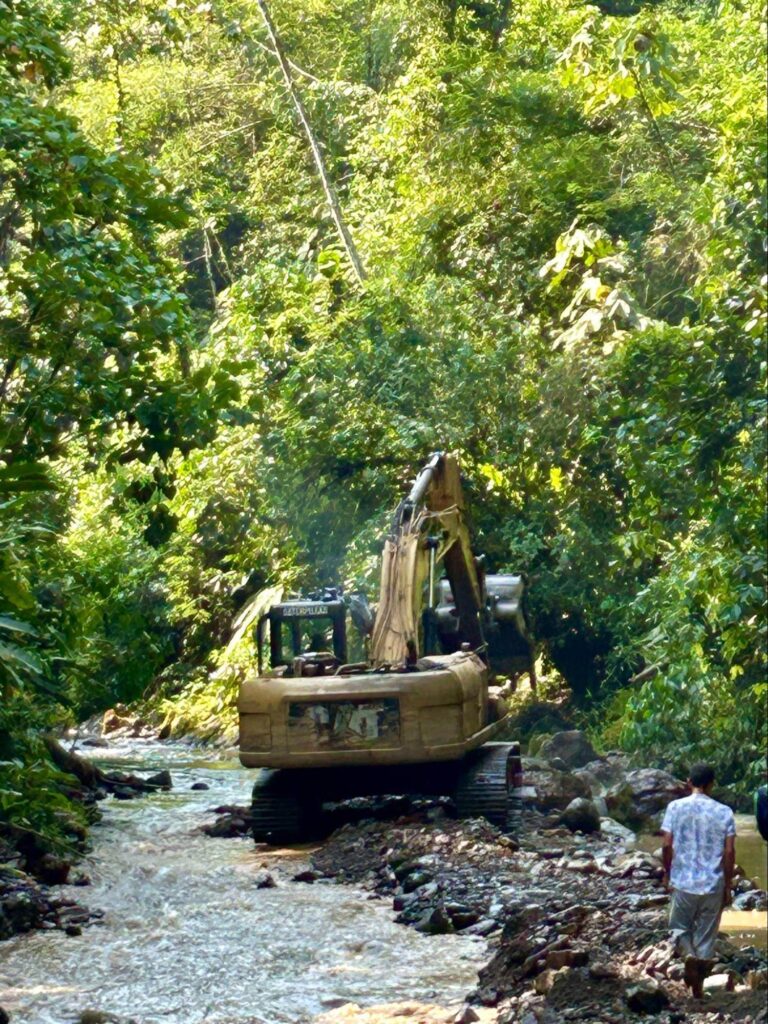by Ollie Hoffman-Paul
Class of 2026, Major (undeclared), Human Rights Advocacy and Global Engagement Minor, they/them/theirs
Upon arriving in Ecuador, I learned about the complex history of colonization in the country. The Incas arrived about 80 years before the Spanish in the 1400s. While the Incas were less violent than the Spanish, they nonetheless transformed the lives of the Indigenous peoples by imposing the Quechua language, which remains prevalent today. Ironically, this “indigenous language” is a relic of a colonial past, not originally native to the region. To maintain control, the Incan empire relocated tribes throughout the country. My program focused on two main areas: the Sierras, near Quito, and the northern Amazon in the Napo region. These regions are about four hours apart and are in vastly different climates; however, they both share the Quechua language. Many in the Sierras have lost their connection to the language and, in an effort to get closer to their Indigenous roots, have begun to learn it again. For many in the Amazon, Quichwa is their first language, while Spanish is learned and taught in schools.
Before heading to the Amazon, our instructors informed us that we would lack internet access due to construction on a new road. This didn’t concern me much; I had low expectations for the internet in the rainforest. However, the reality of this construction became apparent during our journey. After three hours of travel from the Sierras to the site, our program director explained that a company was illegally excavating rock from a nearby river to build the road. This mining had already devastated the riverbank and was set to continue, disrupting the community’s fishing and swimming activities by turning the water black.
Modernity serves as the ultimate goal of colonialism and capitalism, fueling the extraction of natural resources to support an ever-growing global economy. Witnessing illegal mining brought me face-to-face with the harsh realities of capitalism and the extraction of life for societal productivity. My life in the United States had kept me distant from such stark examples of colonialism’s legacy. In many frameworks, the construction of a new road is viewed as beneficial, promising economic opportunities for the community. However, this perspective overlooks the cost of such changes. The planet simply cannot sustain a Western lifestyle for its entire population, yet growth is often measured by the adoption of modern, Western ways. This relentless pursuit of growth is assessed in terms of adopting Western influences, often at the expense of the local environment and culture.
Development looks like monoculture and pesticide use. The cost is deforestation and land degradation, ultimately harming soil and land value. A story from my middle school days echoes in my mind: a businessman questions a fisherman about his catch, suggesting that he should fish more to buy a boat and make more money. This back-and-forth highlights a fundamental question: why must development continue?
At Wesleyan, I learned how systems such as capitalism, colonialism, racism, xenophobia, and consumerism interconnect and shape our daily lives in America. My semester in Ecuador illustrates how these systems contribute to a centuries-old project called Modernity and the associated costs borne by the natural world. Western elitism often adopts a nihilistic view, suggesting that Modernity’s spread is inevitable, resulting from the legal exploitation of unaware populations. However, my experiences in Ecuador have shown me that this narrative dismisses the violence, coercion, and illegal acts that accompany business practices in order to profit from natural resources. Modernity is not inevitable; in fact, it is highly unappealing to many communities, including the one I visited in the Amazon.
After a two-hour-long meeting with the engineers responsible for construction, the community highlighted the multiple national and international laws that had been broken, the company agreed to stop mining. They are now legally and environmentally obligated to extract the rock used to construct the road from the river. The company is not going to use this material for their project but will use it to reinforce the roads around the community. If there is extra, the community is able to keep or sell the material.
Modernity is not inevitable, and those on the frontier reflect that it is legally and environmentally impossible.



